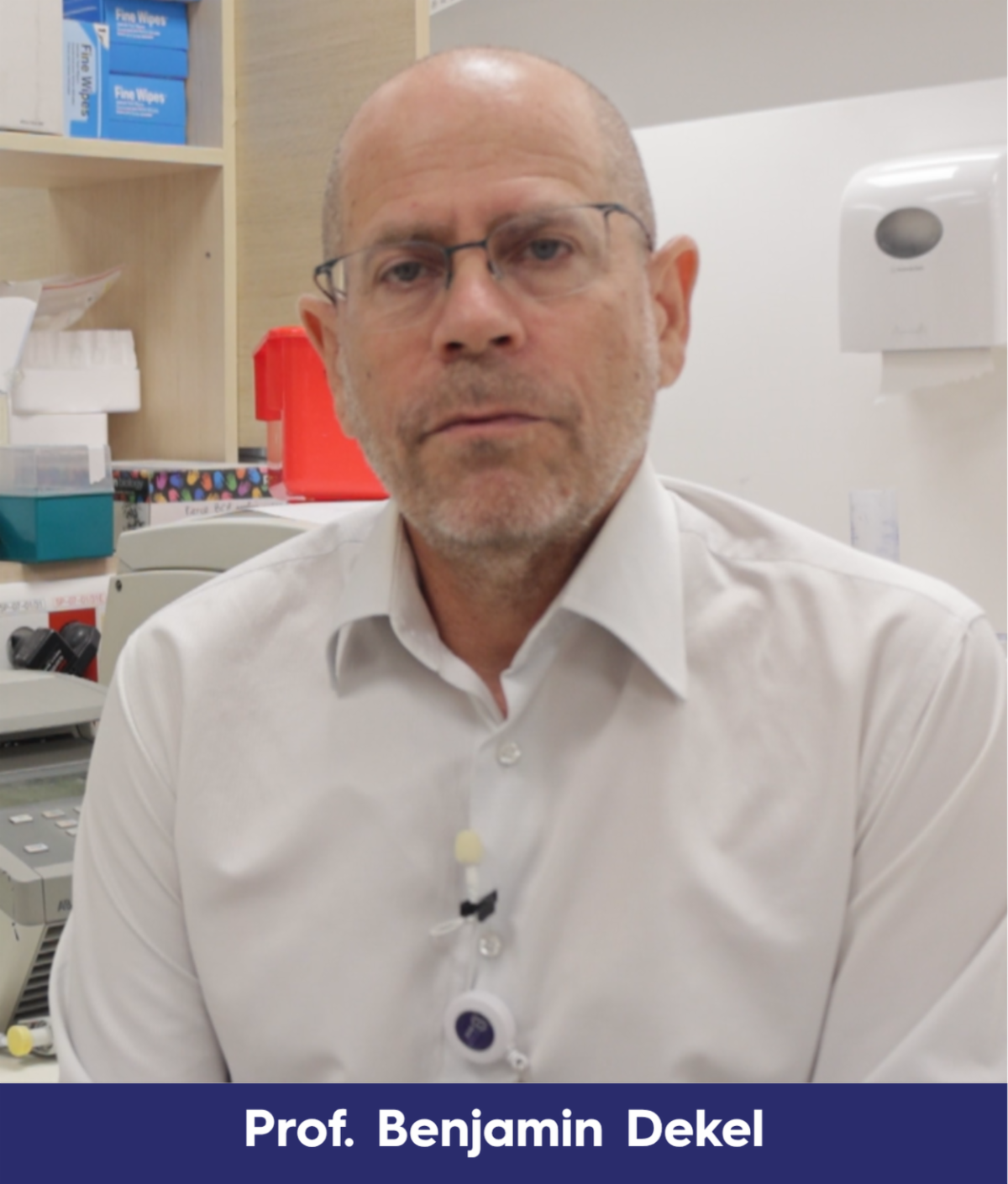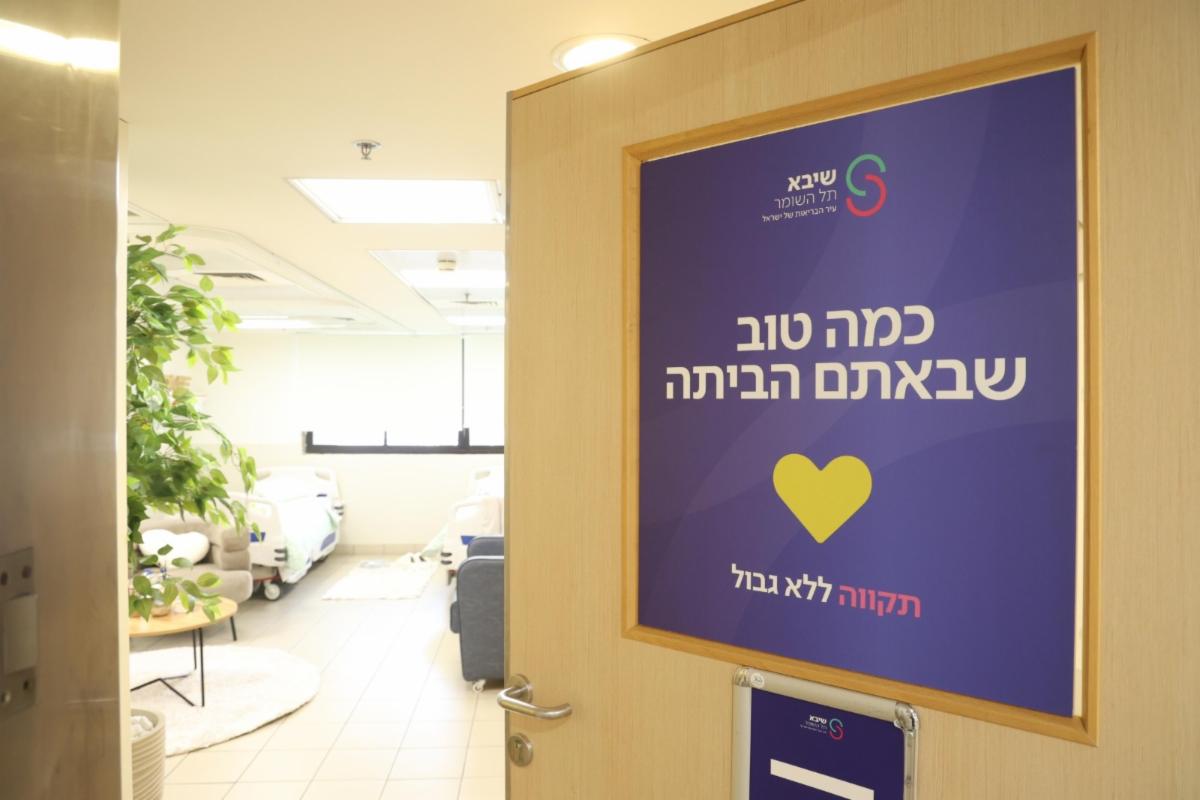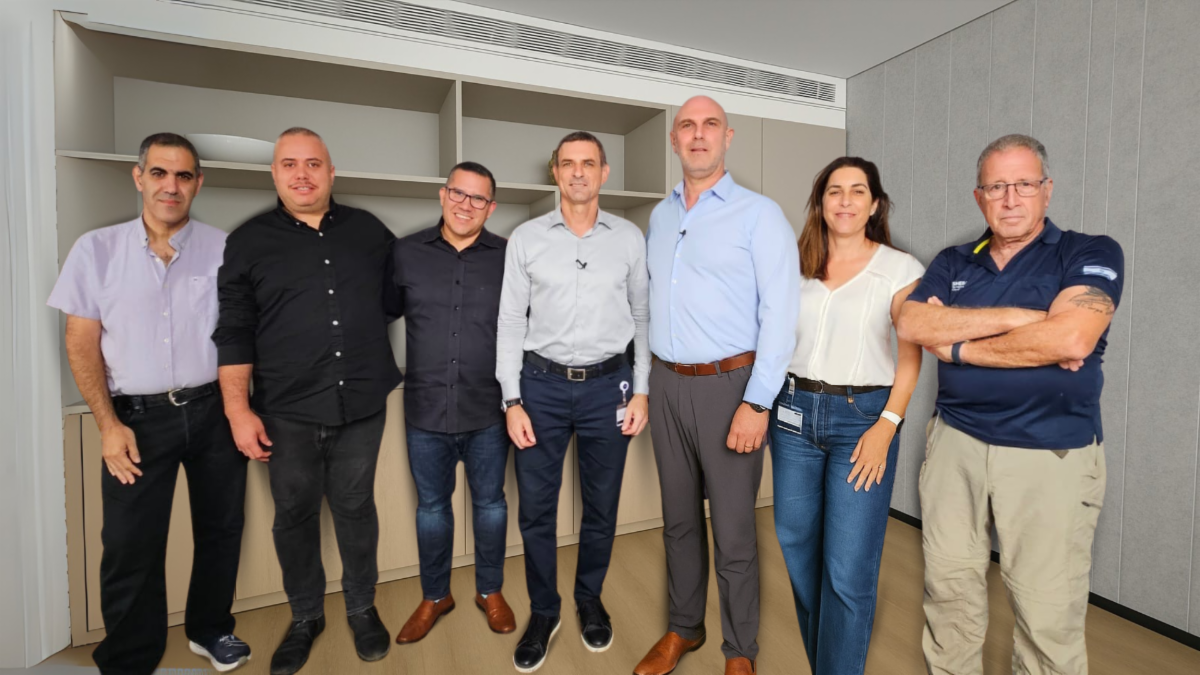2025: A Year of Unprecedented Achievements
For the second year in a row, a global ‘image’ survey determined that Israel was ranked dead last. And yet, Sheba Medical Center defied the negative vibes by ranking as a Top 10 World’s Best Hospital and Top 10 Smart Hospital by the world-renowned Newsweek magazine.
In addition, surveys conducted by the local versions of both Dun & Bradstreet and Forbes magazine determined that Sheba showcased the highest number of respected medical professionals in their field.
Despite the country’s bad ‘image’, thousands of medical professionals, business entrepreneurs, political attaches etc. from around the globe NEVER stopped coming to Sheba to see, experience and collaborate with us on a myriad of projects.
2025 saw Sheba contend with some of the most challenging moments in the hospital’s illustrious history…from moving thousands of patients underground amidst relentless missile attacks from Iran and providing them with tender loving care….to treating hundreds of injured soldiers from Gaza, Lebanon and the West Bank (Judea/Samaria)…to reuniting dozens of emotionally and physically scarred returning hostages with their loved ones.
No other hospital on Planet Earth can revel in the accomplishments of Sheba Medical Center during the past year. We stand proud and resilient in the face of relentless war and hatred and are more than happy to carry the baton of success as Israel’s most renowned hospital into 2026.

Kindling Light Amidst the Darkness
We offer our sincerest condolences to the families and victims of the Sydney massacre and the Australian Jewish community at large, which has endured an unprecedented spike in anti-Semitic incidents during the past few years.
Our Australian Friends of Sheba and Sheba Medical Center itself stand ready to assist in any capacity now and going forward.
It goes without saying that we are extremely concerned about the growing specter of anti-Semitism around the world. Many of the visiting groups to Sheba during the past year have come from countries where anti-Semitic diatribes in the media and on the streets have become part of the “norm” (Examples-Denmark, Sweden, Canada, etc.)
These visits to Sheba continue unabated as these missions to the hospital contain critical messaging within the realm of exposing the reality of things-from saving the lives of critically ill Palestinian children to creating start-up technologies that are saving thousands of lives around the globe. And of course, we showcase resilience and diversity, amidst adversity. Jews, Arabs and Christians working together to heal the body and soul.
So while the dark clouds of madness are enveloping the globe, Sheba continues to project hope without boundaries and offers a beacon of light amidst the gloom.
Chag Chanukah Samayach

The "City of Health" that is Transforming Healthcare on a Global Scale
Even during the height of the various wars and hostage dramas which enveloped our nation and the staff of this hospital, our doctor/researchers/innovators never stopped moving forward on a myriad of transformative research using various tech tools including AI.
These technologies will not only save the lives of Israeli citizens but also tens of thousands of patients around the world, as start-ups that 'mature' at Sheba are constantly being offered to hospitals and health care systems around the world.
Sheba is also on the cusp of revolutionizing breast cancer testing and treatment based on AI technologies. You can see and hear about this below. In addition, get a fascinating insider's view of how gaming is being reworked to address healthcare issues via Sam Glassenberg, a renowned video games mogul who has joined our ARC innovation system, in this edition as well.
What if You Could 'Reveal' Autism and/or ADHD via an AI Neurological Diagnostic Solution?
ARC, Sheba's global healthcare transformation engine and innovation arm announced a collaboration with Revealense, creators of a neurological-AI engine for analyzing behavioral DNA in video footage, to establish a joint venture focused on delivering an advanced neurological diagnostic solution. The joint solution will deliver precise, clinically validated diagnoses across a wide range of neurological, cognitive, and developmental conditions via a standard webcam in the comfort of a patient’s home.
The collaboration between ARC and Revealense signals a new era in neurological diagnostics—digital, personalized, science-driven, and powered by a neurological-AI engine. This innovative model has the potential to redefine diagnostic standards, reduce time to treatment, and deliver more accurate, efficient, and individualized care across a wide range of neurological and developmental conditions.
The first diagnostic protocols, led by Dr. Omer Bar Yosef, Director of the Child Development Center at Sheba Medical Center, will focus on autism, ADHD, and related conditions. Beyond dramatically reducing the time needed for diagnosis, the venture also aims to enable earlier detection of syndromes, potentially allowing for initial assessments of autism and other conditions as early as 6 to 12 months of age.
The new integrated clinical and technological solution will allow diagnostic assessment to be conducted at home via standard webcam, creating a more accessible and convenient process and enabling more accurate data collection by allowing subjects to remain in their natural environment. Unlike conventional tools, the behavioral analysis platform will assess an individual's condition, factor in environmental influences, monitor changes over time, and recommend personalized, treatment-supporting care plans tailored to each user. Additionally, the system will determine the subject’s baseline condition prior to the assessment process, addressing several shortcomings in current neurological diagnostics.
Dov Donin, Founder and CEO of Revealense, said, “This strategic collaboration between Revealense and Sheba’s ARC innovation center represents a profound shift in how we understand, diagnose, and treat neurological disorders. With computational models, deep psychophysiological measurements, and real-time monitoring, we are at the forefront of a clinical revolution. It’s not just a new technology—it’s a paradigm shift that can improve and even save lives, while elevating the entire diagnostics landscape. We plan to accelerate development and regulatory processes in the coming months, with the goal of reaching the market in early 2026.”
Avner Halperin, CEO Sheba Impact at ARC, Sheba’s commercialization arm added, “The collaboration with Revealense exemplifies Sheba and ARC’s unique innovation model—which brings together clinicians on the ground, technological excellence, and robust infrastructure to establish entrepreneurial initiatives. This partnership will enable a faster neurological diagnostic process with increased accuracy and reliability, while improving accessibility by moving from the clinic to home.”
ARC at Sheba Medical Center & China Medical University (Taiwan) Create Partnership to Advance Digital Health Transformation in Asia-Pacific
ARC, the global healthcare transformation engine and innovation arm of Sheba Medical Center, announced the signing of a Memorandum of Understanding (MOU) with China Medical University (CMU) to establish a strategic partnership for planning a new ARC site within CMU's Biopark. This collaboration will serve as a cornerstone for advancing digital transformation, translational research, and healthcare innovation across Taiwan and the Asia-Pacific region.
The partnership brings together CMU's position as Taiwan's leading biotechnology hub with ARC's proven global model for clinician-led healthcare innovation. Under the leadership of Chairman Chang-Hai Tsai, CMU Biopark has emerged as Asia's premier biotechnology center and the nation's first university-based Biopark, demonstrating CMU's commitment to integrating academic excellence with industry collaboration and clinical advancement.
The agreement establishes a framework for creating an innovation ecosystem where academia, industry, and healthcare providers converge to drive digital health transformation. The new ARC site will leverage both institutions' strengths in clinical expertise, big data analytics, artificial intelligence, and biotechnology to accelerate the development and implementation of breakthrough healthcare technologies.
President of CMU, Prof. Mien-Chie Hung, and Founder and Director of ARC, Prof. Eyal Zimlichman, jointly announced the MOU signing, marking the beginning of this landmark collaboration that positions Taiwan as a globally connected health innovation hub.
Prof. Mien-Chie Hung, President of China Medical University, said: "The collaboration with ARC at Sheba Medical Center aligns perfectly with CMU's mission to lead healthcare innovation in Asia. By combining our clinical expertise and research excellence with ARC's proven innovation model, we will establish a sustainable ecosystem that empowers the next generation of healthcare solutions. This partnership will accelerate medical development not only in Taiwan but across the entire region."
Prof. Eyal Zimlichman, Chief Innovation, Transformation, and AI Officer, and Founder and Director of ARC, Sheba Medical Center, said: "This partnership represents a significant expansion of ARC's global network and our commitment to transforming healthcare worldwide through innovation and cross-industry global collaboration. CMU's exceptional research capabilities and established biotechnology ecosystem make it an ideal partner to drive digital health transformation across the Asia-Pacific region. Together, we will create new pathways for clinicians, researchers, and entrepreneurs to deliver breakthrough solutions that improve patient care."
This collaboration is part of ARC's continued global expansion, with additional international ARC site agreements expected to be announced in 2025.
Also in this week's edition, Prof. Yitshak Kreiss narrates what makes Sheba a hospital with "global impact", as well as our medical experts explaining how to confront various maladies impacting global health.
Prof. Benjamin Dekel Spurs Breakthrough in Regenerative Kidney Medicine
|
For the first time researchers from both Sheba Medical Center and Tel Aviv University have grown human kidney organoids (a synthetic 3D organ culture) from tissue stem cells in the laboratory mirroring human fetal kidney development.
The kidney grew and developed over a 34-week process, allowing researchers to see the development of the organ in real time, isolate genes that lead to birth defects, develop new treatments in the field of regenerative medicine, and test the toxicity of drugs during pregnancy on fetal kidneys. |
 |
• This is the longest-lived set of kidney organoids ever developed. The current model has matured and stayed stable for 34 weeks. Previous kidney organoids broke down within four weeks. This allows long-term research and medical testing on kidney models.
It is also the purest kidney organoid ever developed, with no cross contamination from stem cell development. Previous models using pluripotent stem cells would develop other cellular structures due to the mutable nature of the stem cells. The new organoid only expresses kidney cells, allowing for clear cause-and-effect experiments.
The groundbreaking study was led by Prof. Benjamin Dekel, Director of the Pediatric Nephrology Unit and the Stem Cell Research Institute at the Safra Children's Hospital at Sheba Medical Center and Director of the Sagol Center for Regenerative Medicine at Tel Aviv University. Also participating in the study were doctoral student Dr. Michael Namestannikov, a graduate of the Physician-Researcher track at the Faculty of Medicine at Tel Aviv University, and Dr. Osnat Cohen-Sontag, a research associate at Sheba Medical Center, as part of Prof. Dekel's research group.
The study was published in the prestigious medical publication The EMBO Journal.
"Life begins with pluripotent stem cells, which can differentiate into any cell in the body," explains Prof. Dekel. "In the past, they were able to grow organoids - 3D organ-like cultures - by producing such general stem cells and sorting them into kidneys, but after about a month the kidney in culture died, and the process had to be started again. About a decade ago, my research group was able to isolate for the first time the human kidney tissue stem cells that are responsible for the growth of the organ. Now we have succeeded for the first time in growing a human kidney in the form of an organoid from the specific stem cells of the kidney, and this in parallel with the maturation process in the uterus that occurs until the 34th week of pregnancy."
Researchers grow organoids in laboratory conditions to study organs in ways that are not possible in humans, but organoids derived from pluripotent stem cells often contain unwanted cells unrelated to the organ being studied that contaminate experiment data. Dekel's organoid grew from kidney tissue stem cells in a "clean" manner, since these stem cells differentiate exclusively into kidney tissue. These cells developed into different types of kidney cells, and over 34 weeks formed different tissues of the kidney, such as blood filters and urinary ducts, a process known as tubulogenesis.
"Growing a fetal kidney for can shed new light on biological processes in general, and in particular on processes that lead to kidney diseases," says Prof. Dekel. "And indeed, when we selectively blocked certain signaling pathways [in the organoid], we saw how it led to a birth defect. We are actually seeing live how a developmental problem leads to kidney diseases that are seen in the clinic, which will enable the development of innovative treatments."
The implications that go far beyond research. "The fact that we can grow kidney tissue stem cells outside the body over time opens the door to regenerative medicine, that is, transplanting kidney tissue grown in the laboratory – inside the body,” said Prof. Dekel. “We now have an essentially inexhaustible source of different kidney cells, and a better understanding of their different roles in kidney development and function.”
Breakthroughs like this represent Israel’s unique place in the world, says Prof. Dror Harats, Chairman of the Sheba Research Authority. "In recent years, we have witnessed attempts to distance Israel from international centers of influence, and scientific successes of this kind are a reminder that our contribution to medical and scientific research is significant and unquestionable."
Reinvigorating the Embattled Negev Region:
Sheba Medical Center Pioneers National Resilience Center in Sderot
The Western Negev city of Sderot has endured nearly two decades of rocket fire from terror factions in the Gaza Strip, located less than a mile away from its various well-kept neighborhoods. Pictures of mothers running with their frightened children into bomb shelters/safe rooms have been broadcast around the world time and again.
The culmination of these wanton attacks came on October 7th, 2023, when the city was invaded by hundreds of Hamas terrorists and other murderous factions from the Gaza Strip, where police and other heroic citizens fought them street by street, until they were vanquished.
But the collective trauma that the citizens of Sderot had endured over the years needed immediate and ongoing attention.
To that end, Sheba Medical Center has collaborated with Israel’s National Insurance Fund (Bituach Leumi) and the city of Sderot to create a laboratory for resilience technologies and research. The Resilience Center is a $3.6 million dollar project to create a technology accelerator focused on mental resilience and rehabilitation, amongst the first of its kind in the world.
"With the partnership with Sheba and the National Insurance Fund, we are not only giving hope to residents, but also positioning Sderot as a groundbreaking city that will serve as a living laboratory for developing solutions that can change lives – here and around the world," said Alon Davidi, Mayor of Sderot.
Through the decades, the residents have shown the will and determination to stand tall and provide a model of psychological strength to draw from.
"A partnership has been created here of three innovative and leading entities in their fields. We are laying down a broad infrastructure here that will allow us to develop, test and implement solutions in areas of treatment that have so far received almost no technological response - thereby contributing to both the city and the entire healthcare system,” said Avner Halperin, CEO of Sheba Impact. “We are turning the usual pyramid upside down in which leading technological solutions are developed in the center and reach the periphery with a delay of many years."
Sheba’s ARC Innovation Center is administering the project with the ultimate goal of finding solutions to a shortage of mental health professionals in Israel. The center will develop a variety of solutions: apps for self-treatment of mental conditions, technologies for reducing anxiety, systems for rewarding children in times of emergency, smart monitoring devices for analyzing physical conditions, and digital rehabilitation solutions as an alternative to physiotherapy and occupational therapy.
Some of Sheba’s novel products are among the first cohort of projects that will debut at the resilience center, including LIV (Mentaily), an artificial intelligence therapist.
Awaiting Hostage Homecoming & Returning to a Sense of "Normalcy"
 While we are literally in a 'holding pattern' regarding the release of the remaining hostages from the hell of Hamas' Gazan tunnels, Sheba's vaunted "Patient Experience" staff recently completed preparing the beautiful new rooms, which evince all of the comforts of home, including an outdoor terrace and stunning vistas of Central Israel.
While we are literally in a 'holding pattern' regarding the release of the remaining hostages from the hell of Hamas' Gazan tunnels, Sheba's vaunted "Patient Experience" staff recently completed preparing the beautiful new rooms, which evince all of the comforts of home, including an outdoor terrace and stunning vistas of Central Israel.
We have been privileged to quietly take care of nearly 50 returned hostages and their families via our special "Back to Life" outreach clinic, as well as assisting with transformative surgical procedures that have restored their ability to "feel normal" again.
Such has been the case with Romi Gonen, who, upon her discharge from Sheba last week, was effusive in her praise for Sheba's doctors, nurses and rehab personnel, after enduring five months of surgical procedures and intensive rehabilitation. You can read about her incredible recovery in this week's edition.
And, as Sheba returns to a sense of "normalcy" in the aftermath of “Operation Rising Lion", we have created a unique video that, in essence, tells the personal odyssey of three key members of the hospital staff who worked day and night to make sure that patients were moved to safe quarters in an orderly manner and treated with compassion.
A rollercoaster ride of emotions worth watching…
Sheba Showcases Hospital Emergency Preparedness to the World
In the aftermath of "Rising Lion", where Sheba Medical Center executed a precision program to move thousands of patients, medical personnel and support staff to fortified locations under and above ground in the span of 72 hours, which attracted global attention in the mass media and attracted nearly 20 Ambassadors and high-ranking military attaches to see how this was all accomplished, Sheba Global offered a first-of-its-kind webinar last week focusing on "Hospital Emergency Preparedness."
Over 200 senior hospital and governmental officials from 43 countries around the globe, many of them in potential confrontational zones ranging from Europe and the Baltic states to Scandinavia, India and even the Gulf Arab nations participated in the webinar. Several participants also came from countries who still do not maintain diplomatic relations but are acutely aware of Sheba's renowned operations.
Yoel Har-Even, VP of Sheba's Global Affairs, along with Dr. Shahar Shapira, Dep. Dir. Gen. of Ambulatory Services/Director of the Humanitarian Disaster Response Center, Prof. Elhanan Bar-On, Founder of the Humanitarian Disaster Response Center, Gal Dover, Disaster & Casualties Manager and others from Sheba Global, offered expert advice on methodologies used in enabling hospitals to maintain full operational capacity in times of crises, as well as training concepts and fomenting resilience in the face of challenging events.
For those of you who missed the opportunity to see and hear from our Sheba Global staff, we have provided a LINK to the recorded webinar below.

The Sheba Global hospital emergency preparedness webinar team
A First in the World Emergency Response to 'Rising Lion'
During the past 5 years, Sheba's medical personnel, support staff and infrastructure teams have been tasked to stop their daily routines, pivot and then move entire departments to fortified underground locations.
Starting with the corona era and continuing through various conflicts in Gaza and Lebanon, Sheba's 11,000 personnel have performed admirably. But nothing could prepare them for what has taken place during the past 10 days.
For the first time in its 77 year history, Sheba Medical Center has become the first hospital in the world to shift its multitude of patient care divisions into 6 different fortified locations—5 underground and 1 above.
This herculean task has been performed with precision and elan, as Prof. Yitshak Kreiss, Director General of Sheba, has used his unprecedented past experience as the IDF's Surgeon General to create a game-changing scenario amidst heavy rocket fire in the metro Tel Aviv region.
Over 700 patients from a wide range of departments have been moved to various underground locations including:
· Maternity Hospital - Orthopedic Hospital – New MSR (medical simulation) Building
· Padeh Geriatric Hospital
ABOVE ground, the new fortified Azrieli Cardiac Wing is housing sick children from the Lily and Edmond Safra Children's Hospital.
In addition, Sheba has unveiled a state-of-the-art underground fully functional Field Hospital, within a complex that is still under construction. Patients from the stroke/neurology and neurosurgical units are being treated in the Field Hospital.
And as Sheba has always lent an outstretched hand in need, the hospital provided a safe haven for over 40 patients who were in the midst of various treatments at Soroka Hospital in Beersheba, when an Iranian missile struck the facility. They are receiving compassionate care from our medical staff, which has been updated on their condition from the Soroka staff. Truly, hope without boundaries!
In this week's edition, our cameras take you inside our expanding efforts to save lives within a welcoming environment, highlighted by our incredible staff!

Inspirational Moments from "Rising Lion"
|
Though the Sheba staff has executed at least 3 campus wide movements to fortified underground movements during the past 5 plus years, "Rising Lion" spurred an almost military like operation, which no other hospital in the world could execute in such a short period of time.
Swiftly and efficiently, 6 fortified locations, 5 below-1 above, were created within less than 3 days to accommodate over 750 patients across the campus, highlighted by innovative delivery rooms and a state-of-the-art underground field hospital.
Despite the sometimes cramped and noisy quarters underground, doctors, nurses and support staff worked in harmony like a well-oiled machine. More importantly, the patients were not only satisfied with their treatments but they also expressed gratitude to staff members for "feeling safe." (See our exclusive 'Rising Lion' video below) |
 |
During a visit by Ambassadors and Defense Attaches from nearly 15 countries to the underground facilities last week, patients reached out to their visitors to "lionize" Sheba and even requested selfies with several of them as a token of their appreciation. An inspirational moment indeed.
In addition, over a dozen members from international media outlets were given a birds-eye tour of several underground facilities that generated unprecedented global impact coverage from the pan-Arab media to China, and across the Christian world in the USA.
Though Sheba has returned to some semblance of routine, our staff still casts a wary eye on the various battlefields that are still far from quiet and quietly prays for the return of the hostages from the hellholes of Gaza.


